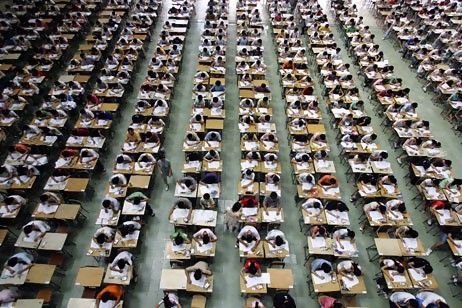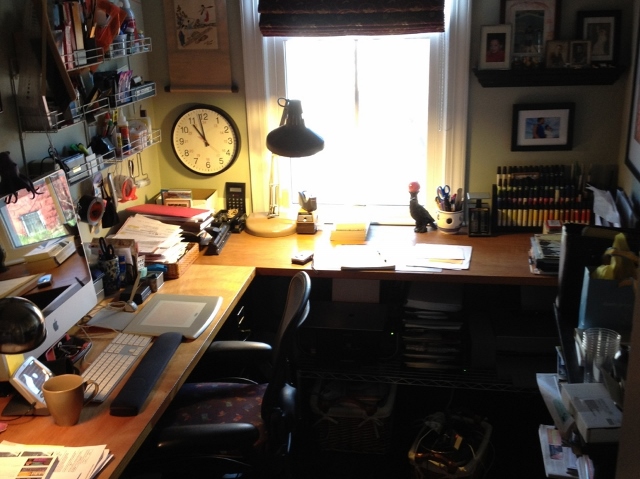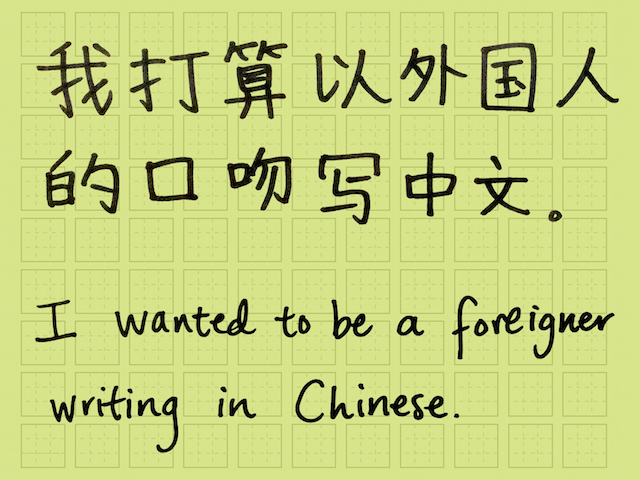Author Jade Chang talks about her new novel ‘The Wangs vs. the World,’ subverting righteous immigrant stories, and asshole as an endearing term.

December 12, 2016
Charles Wang, the patriarch in Jade Chang’s spectacularly funny debut novel The Wangs vs. the World, has seemingly lost everything that he spent years building in America. His cosmetics fortune in shambles, his Bel-Air mansion in foreclosure, he embarks on a cross-country road trip with his second wife and his amah in a vintage powder-blue Mercedes Benz. Along the way, he stops to pick up his youngest daughter, Grace, at private school, and his middle son, Andrew, at Arizona State. Their destination is upstate New York, where his oldest daughter, Saina, has retreated from bad press and a broken engagement. But Charles’s ultimate goal is the Wang family property in China—if only he can prove that he owns it.
This hilarious premise, set against the backdrop of the 2008 recession, deals not only with Charles’s identity crisis, but also his children’s as they try to forge lives for themselves independent of their father’s fortunes. Saina is a conceptual artist, while Andrew is an aspiring standup comedian, and Grace a style blogger.
Chang has written about arts and culture for a variety of publications, including Glamour and the Los Angeles Times magazine, and has drawn from those worlds to create a wholly engaging tale that blends the immigrant novel with a road-trip caper.
I interviewed her at her home in Los Angeles via Skype.
Wendy Lee: How close is the story of the Wang family to your family?
Jade Chang: Zero percent, in terms of the particulars. My parents are still married; I have one younger sister; I don’t have a younger brother. In terms of the Wang family history, their history is similar to mine. My parents are both from families that go back generations in mainland China and their families had to leave because of Communists, the Japanese, World War II. It’s a really interesting story and I grew up hearing so much about it, but I haven’t read a lot about that generation that was either born in China, or their parents came to Taiwan with the Nationalist Army, and grew up as this little community of displaced mainlanders. Many of them came to America to go to grad school.
How did you decide on the last name Wang? My mom’s last name is Wang, so I totally understand how most people mispronounce it with a long a as opposed to Wong.
I just thought it was so unfair that this name that means king in Chinese becomes dick in English. It seems like the ultimate poke in the eye. It encapsulates Charles’s feelings about America, about this foreign land that he’s not entirely sure of but is totally ready to conquer.
While Charles’s situation is tragic, a lot of what happens to him is also quite humorous. For example, in the helicopter accident that takes the life of his first wife, Charles is saved by his “sartoriphilia”—he’s ejected safely because he refuses to crease his shirt with a seatbelt. Did you set out writing this book with the thought that there are these other immigrant novels that are so serious and tragic, and there aren’t many that are funny?
That was a huge driving force for me. I felt that the dominant culture in America wants to hear stories of immigrant pain or righteous struggle. Not just immigrants, people of color as a whole. It’s the same reason movies about slavery can get nominated for Oscars, but movies about black people having fun and living interesting lives have a hard time getting made, much less nominated for an Oscar. When slavery and suffering is the only story, it also means that’s the only way large segments of the population view black people. When we only see Asian immigrant stories that are about terrible culture clashes, parents that are just so angry at their kids for wanting to sing or something, it’s easier for a majority culture to view a minority culture in that way.
People feel like they already know those narratives, so they feel comfortable with them.
Exactly. And that’s just not my experience. I grew up in the San Fernando Valley, which is very mixed. I grew up with mostly Asians, Latinos, and whites. I never had that sense of there’s only one kind of Latino kid, or one kind of Asian kid, but I feel like those are often the stories we see. Writing things that were ridiculous and joyful and also very angry was really important to me.
The three siblings, Saina, Andrew, and Grace, have these artistic, creative pursuits. It’s interesting that they’re all unapologetic about what they want.
That was very important to me. They don’t even consider the possibility that their race might hold them back from creative success—there’s a freedom in that, and I wanted to give them that freedom. In choosing the different things they pursued, I didn’t want anything to do with their race or ethnicity but more with different time periods. Saina is 10 years old than Grace. They’re essentially in different generations—I wanted that to be a factor as well.
Andrew, the aspiring comedian, tells a lot of jokes about Asian accents and the letter r in his first standup routine, and completely bombs. Was it hard to write his material?
I love standup comedy. I’d already written his two sets before I took an improv class, but I wanted to have a sense of what it felt like to stand in front of a group of strangers and really wanting to have them laugh.
How was that experience? Better than Andrew’s, I hope!
[Laughing] I took it at UCB (the Upright Citizens Brigade), and the way they set up their comedy classes, the first few classes you’re not acting, you’re just pitching ideas back and forth. In those classes I was so funny. I would walk out of class thinking, “I should be a comedian! This is the best!” And then class number four… everyone who was in the class with me were working actors who did commercials or had done walk-ons on sitcoms, they were serious aspiring actors. As soon we got to the classes where you’re embodying a character while coming up with lines, I was terrible! I couldn’t be someone else and think at the same time.
Do you feel that’s very different from what you do as a writer? Because as you’re writing about a character, you’re inhabiting them?
Obviously it’s easier on the page. My brain can be a character, but not all of me all at once. In writing those sets, I very much channeled Andrew. I secretly want to do standup, but if I were to do it, I would not use that same material. Improv is a safe kind of danger. The worst thing that happens is people don’t laugh.
Or you get heckled.
Or you get heckled. But nothing actually bad is going to happen to you. You get to have all the excitement and adrenaline of real danger. It’s more psychological danger.
Writing a book is also psychologically dangerous. Something that’s private and a secret for so long, that exists only in your head, is suddenly out in the real world.
True! Did you feel that way when you were writing your novel The Art of Confidence? I loved it by the way—I’m really fascinated by the story that it’s based on, of the Chinese painter living in Queens who forged millions of dollars worth of masterworks, and it was so fun to read your take on it!
I think it’s a bit different when you’re writing something that’s based on a real-life event, whether it’s something that’s autobiographical or something people can look up on the internet. Your take on what happened is going to be different from what other people remember or what actually happened, but that’s part of the license of writing fiction.
When it came to The Art of Confidence, I did follow parts of the case since there were some details that were stranger than fiction—like how the forgers used teabags and hair dryers to “age” the canvas. But the only character that is based on anyone in real life is the forger himself, the Chinese immigrant. It just seemed like such dramatic irony, that he could convincingly imitate some of most famous artists of the 20th century, like Mark Rothko and Jackson Pollock. Although I don’t know if that says more about the people who bought the paintings than the painter.
Since you’re a journalist, did anything you report on make its way into your book?
Definitely. I first went to Art Basel Miami when I was working for Metropolis magazine, and there’s a significant scene that takes place on the day of the vernissage, which is when the festival opens its doors and collectors rush in to buy up pieces. Also, I was an editor at a luxury magazine, and my experience there influenced this book a lot. I was working there in the late summer of 2008, which is when The Wangs is set. I got to see the real highs and lows of the recession from the point of view of the rich people the magazine was targeted toward. This magazine group where I was working had just been sold for all this money—things were on a huge high, and then there was an enormous crash. That very much applied to the wealthy people who owned and bought that magazine, and then also to the not-wealthy people who were working at it.
At that time, it really felt like anything could happen. I thought, “Maybe this entire financial system is going to collapse,” which did not seem impossible at that moment. When it looks like the world is about to turn upside down, it’s an exciting time because you don’t know how things are going to shake out, you don’t know who’s going to end up on top. So I think that feeling, that intense sense of both uncertainty and possibility, that’s what made me want to set a book in that time period, and I don’t know if I would have felt it as acutely if I hadn’t been working where I was during the crash.
I feel like you could categorize this book in a number of different ways. It’s not just an immigrant novel, a road trip novel, or a novel about the recession. Some people have compared it to Crazy Rich Asians by Kevin Kwan.
I totally love that book! I think my book is completely dissimilar, but I do think my book could have been sold under the exact same title and cover.
I don’t feel there are a lot of immigrant novels that deal with finance in this way. There is the narrative about the immigrant who is working hard to achieve the American Dream, but not so many about this kind of financial collapse. And not so many with such a frank sense of money.
I find systems of value to be fascinating. I’m also really interested in sheer commercial endeavor. I went to China with my parents for the first time in 2004, and there were people selling things on the corner that they had just made, everyone trying to make cash in all of these basic ways. It felt exciting and vital, like, “Here we all are, let’s try to make something in the world and sell it!” When I was a kid, I would read the comics, and the front page, and the style stuff, and then I’d read the business stuff.
Speaking of systems that create value, the art world is a big one. Saina learns about it firsthand when she becomes famous at Art Basel due to a stunt where she pays homeless people to wear jackets with her face on them.
It really interested me, this idea that all of these things we have that are worth anything of value, it’s because we collectively decide that they are. We collectively decide a dollar is worth a dollar. Essentially everyone who uses the dollar has to buy into the value of the dollar in order for it to exist. The art world is a much smaller group of people who are ascribing these enormous values to things that could be literally worthless. Things that are no different from things that are worth millions of dollars are worth zero dollars and can’t get anyone to look at them, much less buy them.
Right. Like would anyone have paid millions of dollars for a painting by a Chinese immigrant done in the style of a famous abstract expressionist? It’s the exact same painting. The value isn’t in the actual painting but in other people’s perception of it.
Saina’s art stunt is inspired by her decision to “Be an asshole,” and the thought, “What is any artist, really, but someone who doesn’t mind being an asshole?” It’s a very provocative statement—what do you think about it in relation to writers? “What is any writer, really, but someone who doesn’t mind being an asshole?”
When I say, “Be an asshole,” I mean it in the most endearing of ways. I do think it applies to all artists. I think no matter what, in order to want to be a visual artist or a writer or an actor or a musician, you have to have a certain amount of like, “I’m doing this thing, and it’s worth your time, it’s worth your energy, it’s worth your emotions, it’s worth your intellectual engagement. What I’m doing is worth all of these things from you.” Be the kind of person who is willing to do something with the outpouring of emotion or outpouring of intelligence that will draw people in. I think it’s also just the decision to do anything like that at all, you kind of have to be an asshole.



